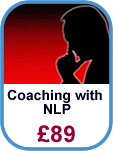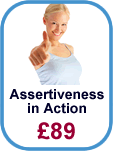Thursday 27 March 2008
Methods of Improving Motivation
Motivation is the ability to use your deepest emotions to move and guide you towards your goals. This ability enables you to take the initiative and persevere in the face of obstacles and setbacks. The following suggestions might also help.
Focus on what you want – If you’re finding it difficult to motivate yourself, perhaps you are not doing what you want to do. Consider what you enjoy and work towards that.
Also, if you focus on the negative aspect of what you don’t want and spend your time moving away from the bad, you may find that you do not feel happy with where you end up. The ‘away from’ motivator is useful to start with, but it is directionless and you should choose a ‘toward’ motivator at the earliest opportunity.
Set a date for your goal – This is crucial. Without a set date of achievement your goal is left hanging and becomes a vague notional wish. Set a date, and if you don’t quite make it, re-assess.
Make the goal compelling – If your goal is not attractive, then you are less likely to work towards in a positive way.
Set milestones – If the goal seems overwhelming, break it down into milestones. This will help you to achieve it by making it seem less daunting.
If it’s not a fun goal, focus on the end result – When your goal seems more of chore, but it simply has to be done, target the end result rather than the drudgery of the task. This way you can focus on the positive feeling of achieving the goal rather than the pain of the task itself.
This is a short excerpt from the Trainers Notes in the Trainer Bubble Training Material, 'Emotional Intelligence at Work'. Visit Trainer Bubble today to buy this great resource.
Focus on what you want – If you’re finding it difficult to motivate yourself, perhaps you are not doing what you want to do. Consider what you enjoy and work towards that.
Also, if you focus on the negative aspect of what you don’t want and spend your time moving away from the bad, you may find that you do not feel happy with where you end up. The ‘away from’ motivator is useful to start with, but it is directionless and you should choose a ‘toward’ motivator at the earliest opportunity.
Set a date for your goal – This is crucial. Without a set date of achievement your goal is left hanging and becomes a vague notional wish. Set a date, and if you don’t quite make it, re-assess.
Make the goal compelling – If your goal is not attractive, then you are less likely to work towards in a positive way.
Set milestones – If the goal seems overwhelming, break it down into milestones. This will help you to achieve it by making it seem less daunting.
If it’s not a fun goal, focus on the end result – When your goal seems more of chore, but it simply has to be done, target the end result rather than the drudgery of the task. This way you can focus on the positive feeling of achieving the goal rather than the pain of the task itself.
This is a short excerpt from the Trainers Notes in the Trainer Bubble Training Material, 'Emotional Intelligence at Work'. Visit Trainer Bubble today to buy this great resource.
Tuesday 18 March 2008
Why conflict can be difficult to resolve
The main reason that conflicts are so difficult to resolve is that they are predominantly influenced by emotions. When emotions like anger and resentment are felt it is often difficult for people to behave rationally. The likelihood of the person understanding the others point of view diminishes as their own strong emotions take over.
Emotions play a role in how people make sense of their relationships, concept of power, and social status. People constantly evaluate situations and events to work out if they are personally relevant. These understandings and appraisals are infused with various emotions and feelings. So, emotion not only serves a side effect of conflict, but also frames the way in which parties understand and define their dispute.
Secondly, within the context of relationships, emotions typically express people's agendas, desires, and goals. When people perceive that they have incompatible goals or that others are interfering with their desires and pursuits, this elicits emotions and leads to conflict.

Imagine an iceberg, a small percentage is above the iceberg and visible, while a large part is below the water line and obscured from view. The small part represents our behaviour; we can see and hear it.
Just below the surface is our emotions – we can neither see nor hear them, but we can often guess how we and others are feeling by observing the behaviours. For example; when someone is smiling, we can guess they are happy, when they frown we guess they are sad etc.
If we go deeper down the iceberg we get to a place that represents the things that are most important to us: our needs and interests. These are the things that drive our emotions and in turn cause us to act and react the way we do when in conflict.
When dealing with conflict it is tempting to overlook the emotional aspect and often we are told to treat things only from an objective point of view. This is dangerous and usually leads to failure. Our aim should be to identify that emotions play a part and look for methods of addressing the emotive issues. Only then can we overcome the substantive needs of those involved.
This article is an excerpt from the training materials for trainers called 'Conflict Handling', which are available from our website at Trainer Bubble. Visit us today and buy this fantastic resource.
Emotions play a role in how people make sense of their relationships, concept of power, and social status. People constantly evaluate situations and events to work out if they are personally relevant. These understandings and appraisals are infused with various emotions and feelings. So, emotion not only serves a side effect of conflict, but also frames the way in which parties understand and define their dispute.
Secondly, within the context of relationships, emotions typically express people's agendas, desires, and goals. When people perceive that they have incompatible goals or that others are interfering with their desires and pursuits, this elicits emotions and leads to conflict.

Imagine an iceberg, a small percentage is above the iceberg and visible, while a large part is below the water line and obscured from view. The small part represents our behaviour; we can see and hear it.
Just below the surface is our emotions – we can neither see nor hear them, but we can often guess how we and others are feeling by observing the behaviours. For example; when someone is smiling, we can guess they are happy, when they frown we guess they are sad etc.
If we go deeper down the iceberg we get to a place that represents the things that are most important to us: our needs and interests. These are the things that drive our emotions and in turn cause us to act and react the way we do when in conflict.
When dealing with conflict it is tempting to overlook the emotional aspect and often we are told to treat things only from an objective point of view. This is dangerous and usually leads to failure. Our aim should be to identify that emotions play a part and look for methods of addressing the emotive issues. Only then can we overcome the substantive needs of those involved.
This article is an excerpt from the training materials for trainers called 'Conflict Handling', which are available from our website at Trainer Bubble. Visit us today and buy this fantastic resource.
Friday 14 March 2008
Jill Bolte Taylor: My stroke of insight - Inspirational, Must see!
And now, when you're ready, take 18 minutes to watch this astonishing talk from Harvard-trained brain scientist Jill Bolte Taylor. It drew a huge standing ovation in the first session of the conference and, by general consensus, counts as one of the most memorable TED talks of all time.
TED TALKS - Jill Bolte Taylor
Neuroanatomist Jill Bolte Taylor had an opportunity few brain scientists would wish for: One morning, she realized she was having a massive stroke. As it happened -- as she felt her brain functions slip away one by one, speech, movement, understanding -- she studied and remembered every moment. This is a powerful story about how our brains define us and connect us to the world and to one another.
TED TALKS - Jill Bolte Taylor
Neuroanatomist Jill Bolte Taylor had an opportunity few brain scientists would wish for: One morning, she realized she was having a massive stroke. As it happened -- as she felt her brain functions slip away one by one, speech, movement, understanding -- she studied and remembered every moment. This is a powerful story about how our brains define us and connect us to the world and to one another.
Wednesday 5 March 2008
Are you 'self' or 'other' centred?
What to do: Using the first finger of your dominant hand, trace out the capital letter ‘Q’ on your forehead.
Analysis: This fun test provides some insight into whether you are ‘self’ or ‘other’ centered. These two types of people have a very different way of seeing the world, and one type is no better or worse than the other.
There are two ways of completing this exercise. Some people draw the tail of the ‘Q’ on the right hand side of their forehead whilst others draw it on the left.

Self-centered people tend to draw the letter Q in a way in which it can be read by themselves. They tend to come across as being the 'same person' in different situations, and their behaviour is guided more by their own values than the needs of others. They pride themselves on being straight with people, and expect others to be honest with them. Because of this, they are not especially good at lying, but are better at detecting lies in others.
People who are other-centered tend to draw the letter Q in a way in which it can be seen by someone facing them. They tend to be concerned with how other people see them. They are happy being the center of attention, can easily adapt their behaviour to suit the situation in which they find themselves, and are skilled at influencing the way in which others see them. Because of this they are often good at lying, but not so good at detecting lies.
This test and others like it are available on Richard Wiseman's fantastic website 'Quirkology', which you can visit at http://www.quirkology.com
Subscribe to:
Posts (Atom)






























